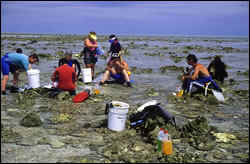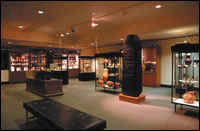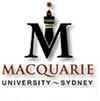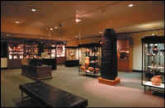Study Natural History
in AustraliaNatural History at Macquarie University: Ruth Mawson
Natural history includes the study of earth sciences, life sciences and anthropology. Although there is no specifically named Natural History unit that can be studied at Macquarie, the Division of Environmental and Life Sciences offers a degree program of study as a combined BSc with a BA in Natural History, Culture and Museum Studies. Within this program, students may study a number of areas of study considered to belong to the natural histories, for example, palaeontology, biology, indigenous studies and geology.
 The program combines a scientific and arts education with added undergraduate experience in museum studies and exposure to museum practice. The 4-year program of study leading to a BSc with BA is offered in specialty areas of particular interest to most national, state and regional museums and for which Macquarie has a high reputation: Australian history, ancient history, archaeology, palaeontology, biology, geology, heritage, early childhood studies and indigenous studies. No university within Australia offers such an undergraduate program. This interdisciplinary degree is designed to: a) enable students to qualify with coherencies (majors) in at least three segments of study, i.e. palaeontology, history, human geography, indigenous studies, early childhood studies, biology or geology, and b) provide students with a modern background for the field of Museum Studies. The program combines a scientific and arts education with added undergraduate experience in museum studies and exposure to museum practice. The 4-year program of study leading to a BSc with BA is offered in specialty areas of particular interest to most national, state and regional museums and for which Macquarie has a high reputation: Australian history, ancient history, archaeology, palaeontology, biology, geology, heritage, early childhood studies and indigenous studies. No university within Australia offers such an undergraduate program. This interdisciplinary degree is designed to: a) enable students to qualify with coherencies (majors) in at least three segments of study, i.e. palaeontology, history, human geography, indigenous studies, early childhood studies, biology or geology, and b) provide students with a modern background for the field of Museum Studies.
 Palaeontologyis a broad discipline that examines traces of life on Earth through time. Through the study of past life, palaeontologists are able to shed light upon the origin and evolution of life, the influence of life on the development of the Earth and its environment, and the climate of the past. Palaeontology provides the tools to unravel the history of life including the devastation wrought by global extinction crises and the effect extinctions events have made to biodiversity. All life forms, past and present, tell us something about the environment we live in and by looking at the past we can make an attempt to predict the future. We need to understand changes in the record of life in order that decision making regarding the future might have a sound basis. Palaeontology is also applied to problem solving in areas such as archaeology climatic history, geomorphology and geology. Palaeontologyis a broad discipline that examines traces of life on Earth through time. Through the study of past life, palaeontologists are able to shed light upon the origin and evolution of life, the influence of life on the development of the Earth and its environment, and the climate of the past. Palaeontology provides the tools to unravel the history of life including the devastation wrought by global extinction crises and the effect extinctions events have made to biodiversity. All life forms, past and present, tell us something about the environment we live in and by looking at the past we can make an attempt to predict the future. We need to understand changes in the record of life in order that decision making regarding the future might have a sound basis. Palaeontology is also applied to problem solving in areas such as archaeology climatic history, geomorphology and geology.
 Geologyis the study of the Earth and the processes that have shaped it over the past 4.6 billion years. The interaction between the inner structure of the Earths surface is expressed in volcanic activity, earthquakes and mountain building; these forces have moulded the surface of the Earth into the continents, and ocean basins that we have today. The Earth is dynamic, ever-changing and endlessly fascinating, as revealed in the rocks and geological structures are around us. Geologyis the study of the Earth and the processes that have shaped it over the past 4.6 billion years. The interaction between the inner structure of the Earths surface is expressed in volcanic activity, earthquakes and mountain building; these forces have moulded the surface of the Earth into the continents, and ocean basins that we have today. The Earth is dynamic, ever-changing and endlessly fascinating, as revealed in the rocks and geological structures are around us.
 Biology, the study of living things, is an important subject for humankind as we move into the 21st century, It encompasses a broad range of knowledge including studies of animals and plants in the Australian context, ecology, evolution and an appreciation of things modern DNA technologies can tell us. In recent times, biodiversity has become one of the frontiers of modern biology because it uses a trans-disciplinary approach to help quantify, understand and manage biological systems. Biology, the study of living things, is an important subject for humankind as we move into the 21st century, It encompasses a broad range of knowledge including studies of animals and plants in the Australian context, ecology, evolution and an appreciation of things modern DNA technologies can tell us. In recent times, biodiversity has become one of the frontiers of modern biology because it uses a trans-disciplinary approach to help quantify, understand and manage biological systems.
Indigenous Studiescovers Aboriginal prehistory and their more recent history through the examination of the interaction of Aboriginal people with their environment. An account of prevailing issues is given from an Aboriginal point of view. A key feature of many of the units in this area of study is the involvement of indigenous lecturers.
 The interdisciplinary 4-year BSc with BA program of study (at least 96 cr pts) is designed in order that students will qualify with coherencies in at least three segments of study, and with a modern background in the field of museum studies. The Bachelor Degree Rules require, among other things, at least 18 credit points above 200-level to be completed in Science units. The interdisciplinary 4-year BSc with BA program of study (at least 96 cr pts) is designed in order that students will qualify with coherencies in at least three segments of study, and with a modern background in the field of museum studies. The Bachelor Degree Rules require, among other things, at least 18 credit points above 200-level to be completed in Science units.
To qualify for a Bachelor of Science with Bachelor of Arts in Natural History, Cultural and Museum Studies, students must include in their program a number of common core units:
-
A 100-level computing unit or equivalent -
ELS202 Information Management and Museums Practice -
HIST309 History, Culture and Museums Studies
 The compulsory units introduce students to information technology management issues in the twenty-first century. These issues are applied through a focus the knowledge of the science and technology utilized by museums. The units also explore ethical, legal, aesthetic and economic issues of relevance to museum collection management and associated museum programs. ELS202 also provides practical experience in museum practice. The compulsory units introduce students to information technology management issues in the twenty-first century. These issues are applied through a focus the knowledge of the science and technology utilized by museums. The units also explore ethical, legal, aesthetic and economic issues of relevance to museum collection management and associated museum programs. ELS202 also provides practical experience in museum practice.
Students must complete a coherency in Palaeontology (Science) plus two more of the listed coherencies; at least one of which must be an Arts coherency (i.e. additional to the Palaeontology coherency you may choose 2 Arts coherencies, orone Arts and one Science coherency:
-
Ancient Mediterranean Cultures (Arts) -
Biology (Science) -
Australian History (Arts) -
Geology (Science) -
Indigenous Studies (Arts) -
Environmental and Cultural Geography (Arts) -
Early Childhood Studies (Arts)
Note: Other coherencies for the program are presently under negotiation.
For details of the units to be studied in the coherencies, visit the web at
http: //www.mq.edu.au/
HIGHER DEGREES IN NATURAL HISTORY
Higher degree studies include MSc (2-3 years) and PhD (3-5 years) research programs and a number of MSc by coursework (generally 1.5 years), for example in Palaeobiology, Geoscience, Wildlife Management, and Conservation Biology (1.5 years). It is also possible for international students to include one or two semesters of a number of Macquarie MSc programs in an MSc they may be undertaking at their home university.
Request Information:
Created by
Contact
Form Generator
|
|


GENERAL INFORMATION
Telephone: 61 2 9850 7111
(switchboard)
Postal address
Macquarie University
Sydney, NSW 2109
Australia
COURSE INFORMATION
A/Prof Ruth Mawson
Telephone: 61 2 9850 8336
Fax: 61 2 9850 6053 rmawson@lsurel.ocs.mq.edu.au
Dr Andrew Simpson
Telephone: 61 2 9850 8183
Fax: 61 2 9850 9671
asimpson@els.mq.edu.au
MACQUARIE INTERNATIONAL
Freecall in Australia:
1800 1818 28
Freecall International:
China: 10800 61 00 241
Indonesia: 001 803 61 186
Japan: 0053 161 0001
Taiwan: 0080 61 1340
General Enquiries:
Telephone: 61 2 9850 7346
Fax: 61 2 9850 7733
Email: iso@mq.edu.au
Postal Address:
Macquarie International
Macquarie University
New South Wales, 2109
Australia
|

 The program combines a scientific and arts education with added undergraduate experience in museum studies and exposure to museum practice. The 4-year program of study leading to a BSc with BA is offered in specialty areas of particular interest to most national, state and regional museums and for which Macquarie has a high reputation: Australian history, ancient history, archaeology, palaeontology, biology, geology, heritage, early childhood studies and indigenous studies. No university within Australia offers such an undergraduate program. This interdisciplinary degree is designed to: a) enable students to qualify with coherencies (majors) in at least three segments of study, i.e. palaeontology, history, human geography, indigenous studies, early childhood studies, biology or geology, and b) provide students with a modern background for the field of Museum Studies.
The program combines a scientific and arts education with added undergraduate experience in museum studies and exposure to museum practice. The 4-year program of study leading to a BSc with BA is offered in specialty areas of particular interest to most national, state and regional museums and for which Macquarie has a high reputation: Australian history, ancient history, archaeology, palaeontology, biology, geology, heritage, early childhood studies and indigenous studies. No university within Australia offers such an undergraduate program. This interdisciplinary degree is designed to: a) enable students to qualify with coherencies (majors) in at least three segments of study, i.e. palaeontology, history, human geography, indigenous studies, early childhood studies, biology or geology, and b) provide students with a modern background for the field of Museum Studies. Palaeontologyis a broad discipline that examines traces of life on Earth through time. Through the study of past life, palaeontologists are able to shed light upon the origin and evolution of life, the influence of life on the development of the Earth and its environment, and the climate of the past. Palaeontology provides the tools to unravel the history of life including the devastation wrought by global extinction crises and the effect extinctions events have made to biodiversity. All life forms, past and present, tell us something about the environment we live in and by looking at the past we can make an attempt to predict the future. We need to understand changes in the record of life in order that decision making regarding the future might have a sound basis. Palaeontology is also applied to problem solving in areas such as archaeology climatic history, geomorphology and geology.
Palaeontologyis a broad discipline that examines traces of life on Earth through time. Through the study of past life, palaeontologists are able to shed light upon the origin and evolution of life, the influence of life on the development of the Earth and its environment, and the climate of the past. Palaeontology provides the tools to unravel the history of life including the devastation wrought by global extinction crises and the effect extinctions events have made to biodiversity. All life forms, past and present, tell us something about the environment we live in and by looking at the past we can make an attempt to predict the future. We need to understand changes in the record of life in order that decision making regarding the future might have a sound basis. Palaeontology is also applied to problem solving in areas such as archaeology climatic history, geomorphology and geology. Geologyis the study of the Earth and the processes that have shaped it over the past 4.6 billion years. The interaction between the inner structure of the Earths surface is expressed in volcanic activity, earthquakes and mountain building; these forces have moulded the surface of the Earth into the continents, and ocean basins that we have today. The Earth is dynamic, ever-changing and endlessly fascinating, as revealed in the rocks and geological structures are around us.
Geologyis the study of the Earth and the processes that have shaped it over the past 4.6 billion years. The interaction between the inner structure of the Earths surface is expressed in volcanic activity, earthquakes and mountain building; these forces have moulded the surface of the Earth into the continents, and ocean basins that we have today. The Earth is dynamic, ever-changing and endlessly fascinating, as revealed in the rocks and geological structures are around us. Biology, the study of living things, is an important subject for humankind as we move into the 21st century, It encompasses a broad range of knowledge including studies of animals and plants in the Australian context, ecology, evolution and an appreciation of things modern DNA technologies can tell us. In recent times, biodiversity has become one of the frontiers of modern biology because it uses a trans-disciplinary approach to help quantify, understand and manage biological systems.
Biology, the study of living things, is an important subject for humankind as we move into the 21st century, It encompasses a broad range of knowledge including studies of animals and plants in the Australian context, ecology, evolution and an appreciation of things modern DNA technologies can tell us. In recent times, biodiversity has become one of the frontiers of modern biology because it uses a trans-disciplinary approach to help quantify, understand and manage biological systems. The interdisciplinary 4-year BSc with BA program of study (at least 96 cr pts) is designed in order that students will qualify with coherencies in at least three segments of study, and with a modern background in the field of museum studies. The Bachelor Degree Rules require, among other things, at least 18 credit points above 200-level to be completed in Science units.
The interdisciplinary 4-year BSc with BA program of study (at least 96 cr pts) is designed in order that students will qualify with coherencies in at least three segments of study, and with a modern background in the field of museum studies. The Bachelor Degree Rules require, among other things, at least 18 credit points above 200-level to be completed in Science units. The compulsory units introduce students to information technology management issues in the twenty-first century. These issues are applied through a focus the knowledge of the science and technology utilized by museums. The units also explore ethical, legal, aesthetic and economic issues of relevance to museum collection management and associated museum programs. ELS202 also provides practical experience in museum practice.
The compulsory units introduce students to information technology management issues in the twenty-first century. These issues are applied through a focus the knowledge of the science and technology utilized by museums. The units also explore ethical, legal, aesthetic and economic issues of relevance to museum collection management and associated museum programs. ELS202 also provides practical experience in museum practice.
